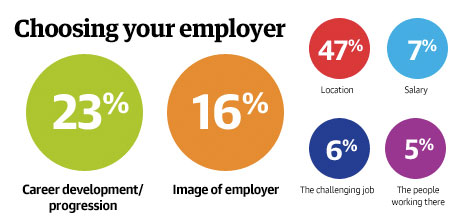So, this begs the question: In what ways can HR professionals positively influence leadership roles and increase the HR function within an organisation?
1. Employer Branding
HR professionals need to recognise and understand their crucial role in employer branding. Gone are the days when attracting talent was left solely to the marketing team. Creating a consistent employer brand image, which ultimately draws in desirable talent, relies on inputs from all of an organisation’s departments, not least the HR department.
It is essential for HR to ensure employer branding is in line with the values of the company. Should this not be the case, organisations could find talent retention decreasing as employees may jump ship if there isn’t brand cohesion throughout the company.
2. Mentor line managers in HR practice
That being said, while employer branding might get new talent through the door, managers have a duty to ensure employees are content and working effectively and efficiently. This will, in turn, lead to an increase in talent retention.
As Helen Rosethorn, CEO of Bernard Hodes explains, ‘people join brands and leave managers.’ Therefore a vital role of HR is to mentor line managers on how best to treat an organisation’s employees. This may sound slightly condescending, however, there are many aspects of the workplace which not all managers are necessarily well versed in. How to deal with a quarrel on the office floor, giving positive and negative feedback when required, managing workers of varying age groups and providing performance reviews – these are all examples of areas where HR advice to line managers is invaluable.
What’s more, according to the Trends Survey, managers are highly motivated to learn more in these areas, so it’s down to HR offer up this guidance. The beauty of this? While it may strain resources in the short term, having line managers able to perform HR duties will ultimately take stress and strain off the HR department.
3. Increase Diversity
It is a known fact that women are grossly under represented in leadership roles within organisations in Ireland. A 2016 Survey by 30% Club Ireland found that only 14% of Irish companies have a female chief executive or Head of Operations. Yet, many studies have found that having more women in the top echelons of a business leads to greater productivity, efficiency and profit.
HR can and must play a central role in rectifying this lack of diversity in the workplace. Firstly, HR can offer more flexible working conditions which may increase employee satisfaction. Secondly HR can ensure that there is no unconscious bias towards males in the workplace. This unconscious bias could be in things like dress code for example. Finally, the most important thing HR should do is raise awareness of the lack of gender diversity. This leads back to HR creating an employer brand – one that appeals to all cohorts of society and aims to harness gender equality in the workplace.
As organisations change and grow to meet the demands of globalisation, so too does the function of HR. HR is much more than the department that deals with contracts and dismissals. As we have seen there are many other, perhaps under acknowledged roles HR can play in order to maximise efficiency and ensure the smooth running of your organisation. Companies must be aware of these in order to get the best out of their workers.
So there you have it, three important roles HR can play in your business that you may not have thought of before.
For more helpful HR tips and advice, CLICK HERE to sign up to our newsletter.


 RSS Feed
RSS Feed